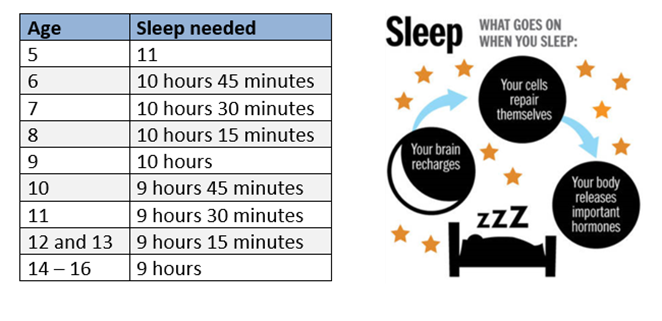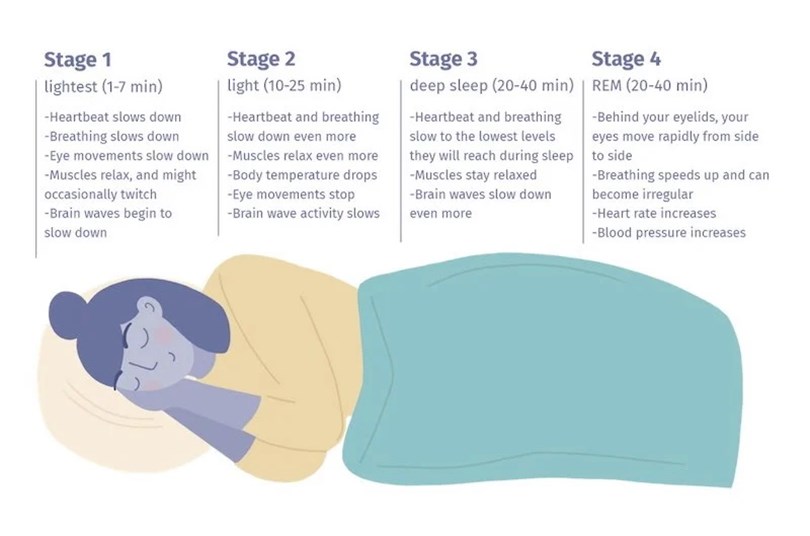The Importance of Sleep
- National Sleep Helpline
Links

Please visit the link below for information and support regarding sleep:
What’s the importance of sleep?
A good night’s sleep is essential to feeling good, being able to learn and staying healthy. A lack of sleep can
make you feel poorly, unable to learn and not want to go out with your friends and family. If you, or your child, is struggling to get a good night’s sleep, follow these top tips:
- Think about your bedtime routine - What time do you go to bed? If you are going to bed too late, you will not
get enough sleep. Try bringing your bedtime forward by 20 to 30 minutes at a time.
- Make sure you are tired before going to bed - the less time you have to spend awake on bed, the better.
- Have at least 15 minutes of quiet time before going to sleep so that your body and brain can relax and
prepare for sleep.
- Don’t use your phone or computer before bed - this can stimulate your brain and make it more awake.
- Try having a lukewarm bath as this can help your body to relax.
- Try to go to bed at the same time every day once you have a settled routine
- Choose a relaxing activity before bed, such as reading or listening to calm music.
- Create a cosy environment. Is the room dark enough? Is the room at the correct temperature... not too hot and not too cold?
Do you know how much sleep your child needs?
The amount of sleep that your child is recommended to have is based upon their age. The NHS recommends the following:

Avoid screens in the bedroom
Tablets, smartphones, TVs and other electronic gadgets can affect how easily children get to sleep. Older children may also stay up late or even wake in the middle of the night to use social media. Try to keep your child's bedroom a screen-free zone and get them to charge their phones in another room.
Encourage your child to stop using screens an hour before bedtime.
Your child's bedroom
Your child's bedroom should ideally be dark, quiet and tidy. It should be well ventilated and kept at a temperature of about 18 to 24 degrees. If you can, fit some thick curtains to block out any daylight, especially now as the days are getting longer.
If you have tried these tips, but your child is regularly having problems sleeping, you may feel that you need further support. You can speak with your GP or health visitor who may be able to provide additional information. Of course, you are also very welcome to speak to a member of staff at school.

Here are some ways in which you can build chill out time into your regular routine
- Make ‘down time’ a rule for everyone in the house.
- Encourage good use of ‘down time’ by making new books available to read, introducing a new style of music to listen to or helping your child to learn a craft.
- Don’t over fill your child’s week with organised clubs and activities.
- Encourage good time-management techniques. Younger children can be shown how to learn a couple of spellings a night rather than leaving them all to the last minute, for example. Older children can learn to pack their bags the night before school or make a ‘to do’ list.
- Try to eat together as a family as often as possible and ban phones and other devices from the table. Family meal time is a great time to talk and reflect on the day and share ideas.
- Plan regular family activities such as a bike ride, movie night or trip to the local park
- Play board games or card games together. Teach your child the games you knew as a youngster and let them teach you their favourites.
- Prioritise sleep. Younger children in particular benefit from a regular bedtime routine. Make late nights an exceptional treat, even at weekends.
- Regularly review your child’s workload, to include school work, socialising time, clubs, sports and activities. Make sure that you continue to be able to achieve a daily spell of ‘down time’. As they get older, include them in this.
- Let your child see you following ‘down time’ rules too. Teach them that stress is a
- fact of life for everyone and that what matters is being able to manage it





